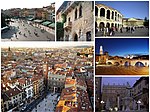Castelvecchio Museum
Art museums and galleries in VenetoBuildings and structures in VeronaCastelvecchio MuseumModernist architecture in ItalyMuseums in Verona ... and 2 more
Sculpture galleries in ItalyTourist attractions in Verona

Castelvecchio Museum (Italian: Museo Civico di Castelvecchio) is a museum in Verona, northern Italy, located in the eponymous medieval castle. Restoration by the architect Carlo Scarpa between 1959 and 1973 has enhanced the appearance of the building and exhibits. Scarpa's architectural style is visible in the details for doorways, staircases, furnishings, and even fixtures designed to hold a specific piece of artwork. The renovation carefully balanced new and old, revealing the history of the original building where appropriate. Unusual at the time, this approach has now become a common approach to renovation.
Excerpt from the Wikipedia article Castelvecchio Museum (License: CC BY-SA 3.0, Authors, Images).Castelvecchio Museum
Largo Don Giovanni Bosco, Verona San Zeno
Geographical coordinates (GPS) Address Nearby Places Show on map
Geographical coordinates (GPS)
| Latitude | Longitude |
|---|---|
| N 45.44 ° | E 10.987777777778 ° |
Address
Castelvecchio
Largo Don Giovanni Bosco
37122 Verona, San Zeno
Veneto, Italy
Open on Google Maps










